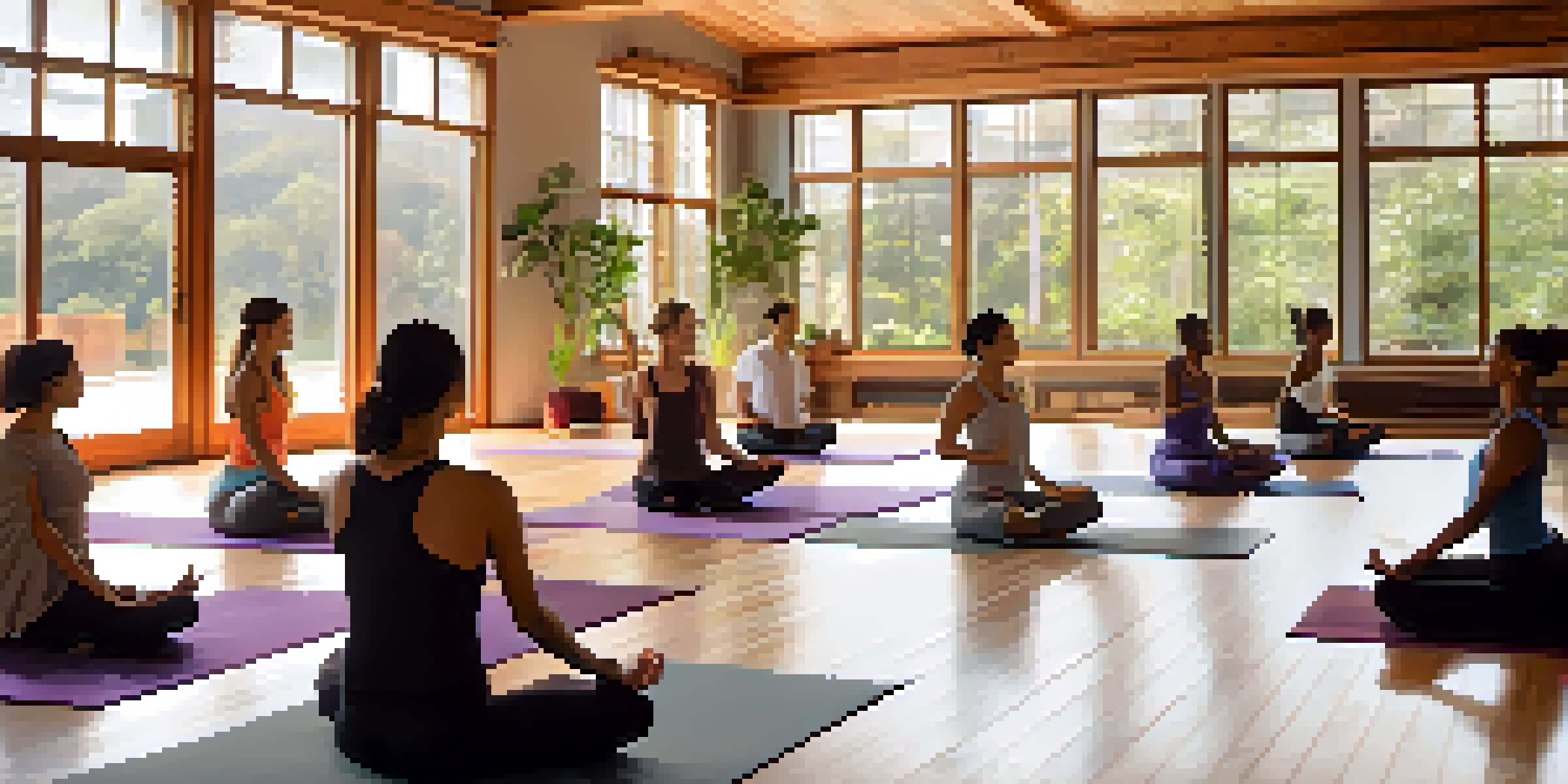The Benefits of Hatha Yoga for Individuals with PTSD

Understanding PTSD and Its Challenges
Post-Traumatic Stress Disorder (PTSD) can feel like a heavy weight, often leaving individuals feeling trapped in their own minds. It can stem from traumatic experiences, manifesting through flashbacks, anxiety, and emotional numbing. Many people find it hard to cope with daily life after such events, leading to isolation and distress.
The greatest weapon against stress is our ability to choose one thought over another.
The symptoms of PTSD can significantly impact one's quality of life. For some, traditional therapies like counseling or medication may not provide the relief they seek. This is where alternative therapies, like Hatha Yoga, come into play as a complementary approach.
Understanding PTSD is crucial to addressing it effectively. By recognizing the challenges faced by those living with this condition, we can explore supportive methods that promote healing and well-being.
What is Hatha Yoga?
Hatha Yoga is a branch of yoga that emphasizes physical postures, breathing techniques, and meditation. It's often considered a gentle form of yoga, making it accessible for beginners and those dealing with physical or emotional challenges. The practice focuses on aligning the body and mind, creating a sense of balance and calm.

One of the beautiful aspects of Hatha Yoga is its adaptability. Practitioners can modify poses to suit their comfort level, allowing for a personalized experience. This flexibility can be particularly beneficial for individuals with PTSD, as they can engage in the practice at their own pace.
PTSD Impact on Daily Life
PTSD can severely affect daily functioning, leading to isolation and distress for those who experience it.
By combining movement with breath, Hatha Yoga encourages mindfulness—a key element in managing PTSD symptoms. This connection between body and mind helps individuals cultivate a deeper awareness of their feelings and reactions.
The Role of Breath in Hatha Yoga
Breath is a powerful tool in Hatha Yoga, often used to enhance relaxation and focus. Deep, mindful breathing can help calm the nervous system, which may be particularly beneficial for those experiencing anxiety from PTSD. This practice encourages individuals to slow down and connect with their breath, creating a sense of safety.
Yoga is the journey of the self, through the self, to the self.
In moments of distress, the breath often becomes shallow and rapid. By consciously engaging in deep breathing exercises found in Hatha Yoga, individuals can counteract this response. Over time, they may find it easier to manage anxiety and stress both on and off the mat.
This focus on breath not only aids in relaxation but also fosters a sense of control. For individuals with PTSD, reclaiming control over their breath can symbolize a larger reclaiming of their lives, paving the way for healing and resilience.
Physical Benefits of Hatha Yoga for PTSD
Engaging in Hatha Yoga can lead to numerous physical benefits that complement its mental health advantages. Regular practice promotes flexibility, strength, and balance, which can enhance overall well-being. For individuals with PTSD, these physical improvements can also translate to increased confidence and body awareness.
Moreover, the gentle movements in Hatha Yoga can help release built-up tension in the body. Many people with PTSD carry physical symptoms of stress, such as tight shoulders or back pain. Through mindful stretching and poses, Hatha Yoga offers a way to alleviate this discomfort.
Hatha Yoga as a Healing Tool
Hatha Yoga offers a gentle approach that combines physical movement and breath, promoting healing for individuals with PTSD.
These physical benefits can create a positive feedback loop. As individuals feel better physically, they may also experience improvements in their mental health, leading to a more holistic approach to managing PTSD.
Mental Health Benefits of Hatha Yoga
Hatha Yoga promotes mental clarity and emotional stability, which can be incredibly beneficial for those dealing with PTSD. The practice encourages self-reflection and introspection, helping individuals process their emotions in a safe space. This can lead to greater self-acceptance and understanding.
Mindfulness cultivated through Hatha Yoga can also help individuals detach from negative thought patterns. Instead of being overwhelmed by intrusive thoughts or flashbacks, practitioners learn to observe their thoughts without judgment. This shift in perspective can significantly reduce anxiety and improve overall mental health.
Additionally, the community aspect of yoga can foster a sense of belonging. For those with PTSD, connecting with others who understand their struggles can be immensely healing. Group classes or support sessions can help individuals feel less isolated on their journey.
Creating a Safe Space for Healing
One of the most important aspects of practicing Hatha Yoga, especially for those with PTSD, is creating a safe and supportive environment. Whether in a studio or at home, having a space that feels secure allows individuals to explore their practice without fear of judgment. This safety is crucial for emotional healing.
Instructors who understand the unique challenges faced by individuals with PTSD can tailor classes to be more inclusive and gentle. This personalized approach can help participants feel more comfortable, allowing them to engage fully in their practice. Communication is key in ensuring that everyone feels respected and supported.
Creating Safe Healing Spaces
Establishing a supportive environment is essential for individuals with PTSD to explore their yoga practice without fear of judgment.
Creating this safe space is not just physical; it also involves fostering a mindset of compassion and acceptance. Encouraging individuals to listen to their bodies and honor their limits can lead to a transformative experience that promotes healing.
Incorporating Hatha Yoga into Daily Life
Incorporating Hatha Yoga into daily routines can be a simple yet powerful way to support mental health for those with PTSD. Even a short daily practice can yield significant benefits, making it more manageable for individuals with busy lives. Simple stretches or breathing exercises can be done at home, requiring minimal time and space.
Many individuals find that creating a routine helps them stay committed to their practice. Setting aside a specific time each day for yoga, whether it's morning or evening, can instill a sense of discipline and purpose. Over time, this consistency can lead to deeper benefits.

Additionally, finding online resources or local classes can help individuals stay connected to their practice. Engaging with a community, even virtually, can provide encouragement and motivation, reinforcing the healing benefits of Hatha Yoga.